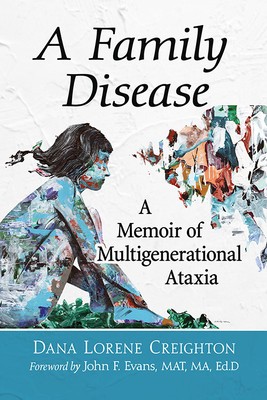
- We will send in 10–14 business days.
- Author: Dana Lorene Creighton
- Publisher: Toplight Books
- ISBN-10: 1476683182
- ISBN-13: 9781476683188
- Format: 15.2 x 22.9 x 1.2 cm, minkšti viršeliai
- Language: English
- SAVE -10% with code: EXTRA
Reviews
Description
Dana Creighton and her mother both were affected by the same inherited cerebellar degeneration, known as ataxia--a loss of control over body movements. Both were treated by a healthcare system that failed them in different ways. Yet their experiences were disparate. Creighton eventually found the right tools to piece together meaning in her life; her mother resisted accepting her condition, in part because doctors repeatedly said nothing was wrong with her. Twenty-five years after her mother's suicide, Creighton's memoir finds striking similarities and differences in their lives and traces a lineage of family trauma. Drawing on research in neuroplasticity, medical records, personal correspondence and genealogy, the author highlights the gap between the lived experience of a debilitating ailment and the impersonal aims of clinicians. She shows how the stories parents tell themselves about living with a genetic disorder influences how they communicate it to their children.
EXTRA 10 % discount with code: EXTRA
The promotion ends in 22d.13:27:43
The discount code is valid when purchasing from 10 €. Discounts do not stack.
- Author: Dana Lorene Creighton
- Publisher: Toplight Books
- ISBN-10: 1476683182
- ISBN-13: 9781476683188
- Format: 15.2 x 22.9 x 1.2 cm, minkšti viršeliai
- Language: English English
Dana Creighton and her mother both were affected by the same inherited cerebellar degeneration, known as ataxia--a loss of control over body movements. Both were treated by a healthcare system that failed them in different ways. Yet their experiences were disparate. Creighton eventually found the right tools to piece together meaning in her life; her mother resisted accepting her condition, in part because doctors repeatedly said nothing was wrong with her. Twenty-five years after her mother's suicide, Creighton's memoir finds striking similarities and differences in their lives and traces a lineage of family trauma. Drawing on research in neuroplasticity, medical records, personal correspondence and genealogy, the author highlights the gap between the lived experience of a debilitating ailment and the impersonal aims of clinicians. She shows how the stories parents tell themselves about living with a genetic disorder influences how they communicate it to their children.


Reviews